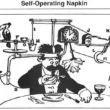The second time I heard the joke I was standing on a hilltop in the middle of the night overlooking Kabul, Afghanistan in February, 2004. I finally got the joke that second time I heard it, but only because I had just had the same gag pulled on me while appearing on CNBC’s Kudlow & Cramer show a few weeks earlier. I’ll start there.
Overstock had gone public in May 2002 and, by the end of 2003, in the eyes of some, it was doing well. In 2003, its fourth year of business, Overstock’s revenue was just shy of $300 million. Many competitors had come and gone, amassing losses of half-a-billion or more, before shutting their doors. Amazon, the 800-pound gorilla in our industry, had burned $3 billion in its start-up cycle before having a profitable quarter. By comparison, Overstock had lost $68 million but had already had one GAAP-profitable quarter (“GAAP” = “Generally Accepted Accounting Principles,” the strictest accounting measure of profitability). In addition, Overstock had had two EBITDA-positive quarters (“EBITDA” = “Earnings Before Interest, taxes, Depreciation, and Amortization,” a somewhat looser standard that some on Wall Street apply to companies on the grounds that it better approximates the “true” economics of a firm). Moreover, in 2002 Overstock had a full year (2002) of positive operating cash-flow (cash-generating ability is another way, and to some the people, the most important way, of measuring a firm’s real economics). In addition, Overstock had ended 2003 with a bang-up quarter, growing 94% and generating $21.9 million in operating cash flow for Q4. All this occurred while we were jockeying around capital and infrastructure that were miniscule in comparison with the hundreds of millions, or even billions, that “Wall Street’s darlings” had been employing.
As was becoming my custom, at the end of the quarter I wrote a lengthy shareholder letter explaining what was going on in the business, where my colleagues were doing well, where I was screwing up, and projects the company needed to accomplish in the future. In that letter I mentioned, “Gross profit,” a term about as common in the discussion of financial statements as, I’d estimate, the term “wide receiver” is in discussions of football (in the case of my letter, 2.5% of the letter concerned gross profit).
The day our earnings press release appeared (with my letter embedded in it), Larry Kudlow & Jim Cramer of CNBC invited me to appear on their TV show. I had been on Kudlow & Cramer once or twice by then and they seemed like smart, decent fellows, so I agreed, and drove to the studio in Salt Lake City from whence one does remote interviews. This interview was different from our prior ones, however, in that they attacked me aggresively. The basis of their attack was my use of the mysterious phrase, “Gross profit,” in my discussion of Overstock’s financials. Cramer in particular berated me as if he had caught me in some heinous incantation. They gave me a brief moment to respond, then quickly signed off.
As I drove away from the studio feeling somewhat mystified, my cell phone rang. The caller was a man from deep within Wall Street “smart money” circles, someone known widely within the hedge fund community, who has been friendly to me, and even has looked out for me when he could. He speaks in charming if profane emphatics.
He said, “You know what just happened, don’t you?”
“What do you mean?” I asked.
“You want to know what just happened? I’ll f—ing tell you what just happened. Here’s how it works. Those two guys are part of the short-seller community. Cramer especially is part of this ring of hard-charging short-sellers on Wall Street. I’ll bet you anything that one of his buddies is short your company. Whoever it is saw your earnings release, saw you blew your numbers away, got on the phone to Cramer and said, ‘Don’t you dare let this thing start moving. Don’t you f—ing dare let this move!’ So Cramer goes on TV and screams that nonsense at you. I bet my last f—ing dollar that’s what happened. It’s been like this all my career, but it’s never been like this.”
Later that week, a fund manager who had seen the interview told me, “That was the most unprofessional interview I have ever seen in my life.” In time, others would mention it to me, so that months and even a year later, I’d meet people who said, “I saw you on with Cramer one time. That was the craziest interview I ever saw.”
That was the first time I heard the joke, but I did not get it until I heard it the second time, a few weeks later, in February, 2004, while I was in Kabul (because it is a natural next question: I was in Afghanistan searching for artisans to become suppliers for Worldstock). Our PR Director at the time, a calm, mellow Californian named “Scott,” had sent an urgent message saying that a BusinessWeek reporter, Tim Mullaney, was going to write a story attacking the price comparisons listed on Overstock’s website. Mullaney was asking about a set of products which were precisely the same products that another two reporters had called asking about that same week. Since Overstock had about 12,000 products at the time, the coincidence was odd. In addition Scott said, Mullaney was acting as though he wanted us to know he planned on writing a hatchet job.
Scott wanted me to contact Mullaney at BusinessWeek. I had a rented satellite phone in my luggage, so I charged it and walked up a hill overlooking my hotel on the outskirts of Kabul, and called Tim Mullaney at BusinessWeek’s offices in New York.
As background, here is the lowdown on price comparisons. Price comparisons are imperfect because price data is imperfect. Overstock does the best it can to give real price comparisons, updating data as we learn it (electronic products are the most troublesome because prices can drop suddenly when new models are introduced). Above all, Overstock is clear about its price comparison methods. Every month Overstock sells a million items, and a few dozen times a customer informs us that a price comparison is wrong, at which point we update our system with the new data, if we have not already caught it ourselves. This always seemed like a pretty fair system (but recently Overstock adopted Amazon’s price comparison methods).
So in February 2004 I was standing in the wind on a hilltop outside Kabul in the middle of the night trying to explain this to a BusinessWeek reporter through the static of a satellite phone. As I spoke he started saying, “Uh-huh, uh-huh, uh-huh.” I paused, thinking he was indicating he understood and had another question to which he wished to move on, but none came. “I’m sorry, were you asking me something?” I asked.
“No, no, go ahead, I’m with you,” Mullaney answered, adding “Uh-huh, uh-huh uh-huh” as soon as I started to speak.
Mullaney asked me about a few electronic products, and I explained to him the issue with electronics: that when a manufacturer introduces a new product the comparison price on the older product drops, and can catch Overstock off-guard until we catch the change ourselves or a consumer notifies us. He had an example of a competitor selling a television for a price that was $20 below Overstock’s: he had not factored in the fact that they were charging $100 shipping, and Overstock charged $2.95 shipping, so in reality their real price was $77 higher than Overstock’s. I began to explain this to him. “Uh-huh uh-huh uh-huh,” he said, cutting me off.
I signed off, perplexed.
The next day I got a message from that same man within Wall Street’s “smart money” set, the one who had called me after the bizarre Kudlow & Cramer interview. His message to me in Kabul was that the word was out around Wall Street that negative stories on Overstock were about to appear in BusinessWeek and The New York Post. He even predicted the days they would appear and the lines of attack.
The stories did subsequently appear on the days he predicted they would, and they said just what he had told me they were going to say.
That was odd, because hedge funds are not supposed to know the timing and content of articles coming out in the press before the general public does. I’m not sure, but I think I read that somewhere.
That’s when I got the joke. It was the second time I’d heard it (Kudlow & Cramer was the first) but I’ve always been a bit slow on the uptake.
Since that time there have been many strange moments and I’ve learned a lot. I will not try to convince you of anything, but for the rest of this chapter I am going to tell you that same joke, in numerous ways. Most of the things I write here you will be able to check, but some you will not, in which case you’ll have to decide for yourself if I am telling the truth.
Even if you never heard of or cared about Overstock.com, you should know this: if you invest in the US stockmarkets, then whether or not you get this joke, it gets you.




I can’t agree completely on arner | Deep Capture any way you provided here some valid info, i am looking forward to surf more on this…
This design is incredible! You most certainly know how to keep a reader entertained.
Between your wit and your videos, I was almost moved
to start my own blog (well, almost…HaHa!) Excellent job.
I really loved what you had to say, and more than that, how you presented
it. Too cool!